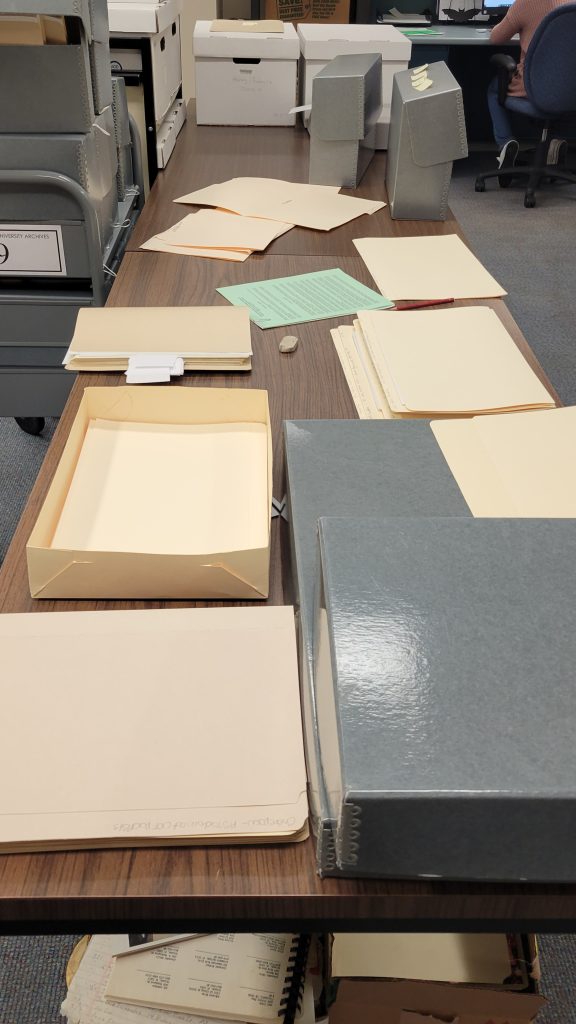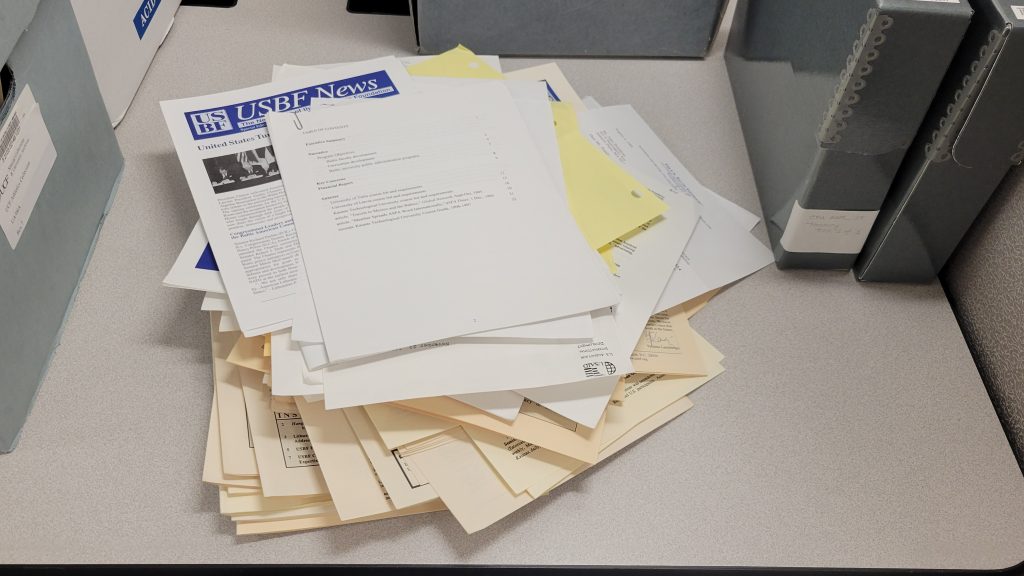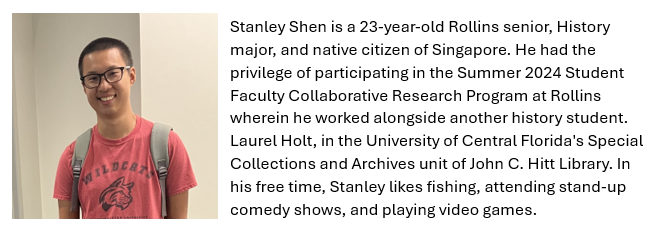Lessons Learned Processing The U.S.-Baltic Foundation Records at UCF’s Special Collections and University Archives
Written by Stanley Shen and Rachel Walton
From the first day of his time working in the UCF Special Collections and Archives unit, Stanley Shen enjoyed the work. The highlight was using the Automated Retrieval Center (ARC) mechanism in UCF’s John C. Hitt Library to call up archival boxes using a set of enormous mechanical robot arms powered by a supercomputer – what a rush! The ARC has location information for every single book and item in the library, including much of the archival collection materials. The ARC’s huge, gridded warehouse system and can retrieve items on command in seconds. Head of Special Collections and University Archives, David Benjamin demonstrated the ARC and offered Stanley an in-depth tour of the entire archives facility, which makes up several floors of Hitt Library. In this early moment of his Summer 2024 internship Stanley was exposed to the good, the bad, and the ugly side of saving old and historic materials in a less-than-ideal preservation environment; a scenario most archives find themselves grappling with today.

During his internship, Stanley worked on a newly donated collection to the UCF archives — The U.S.-Baltic Foundation Records. The U.S.-Baltic Foundation (USBF) was founded in 1990 as a response to the collapse of the Soviet Union and the United States’ desire to restore independence and democracy to the Baltic States. In 1990, the organization obtained non-profit status. As part of the U.S. Democracy Network, the U.S.-Baltic Foundation received a 2.4-million-dollar budget from Congress to work with Baltic organizations and embassies to aid in the democratization of Latvia, Lithuania, and Estonia. USBF held Baltic Municipal Management Seminars and established Municipal Training Centers, which taught local Baltic officials how to govern in a capitalist system. Municipal Training Centers were created in partnership with universities in the Baltic States, including the University of Tartu in Estonia, the University of Latvia, and the Kaunas Technological University in Lithuania, emphasizing decentralization and providing opportunities to visit America and observe how a government operated in a capitalist society.

The collection originally consisted of five boxes that were loosely organized. At first, Stanley was overwhelmed with the number and variety of materials and did not know how to begin. He had always imagined that archivists were people who looked through “old stuff” all day, but trying to dive into that work himself took him way out of his comfort zone. Before the internship experience started, Rachel Walton, the librarian and Rollins faculty member leading Stanley through his summer program, asked the budding history scholar to read a lot of scholarship on archival best practices. Those readings, while not super-exciting, had important information on what archives needed to ensure preservation of and access to historic records — temperature and humidity control, metadata standards, patron registration systems, and much more. But Stanley felt those readings could not have prepared him for the “processing” work he face in his internship. Processing, a standard archival term, refers to the step of going through a collection to understand it and determine the correct system for organizing it.
Luckily Arielle, one of the archivists in UCF’s special collections who supervised Stanley, guided him through some initial decision-making steps that helped him consider how to start tackling this work in bits and pieces. Form there he walked himself through a kind of checklist process that allowed him to get to know the materials while also documenting what he encountered. The first item on the checklist was to research what information could be found on the subject of the USBF. Stanley’s initial searches were not productive. There were no websites about the U.S.-Baltic Foundation, no Wikipedia page, or any mention really anywhere or the organization’s activities, beyond one article mentioning the U.S.-Baltic Foundation’s connection to the University of Central Florida. There was a new dual undergraduate program in public administration and nonprofit management, in partnership with Kaunas University of Technology in Lithuania — but that was the lone connection to UCF. The next step was finding out what was in the collection – what types of documents were created and across what years? So Stanley combed through the collection meticulously looking at as many individual files as he could to answer these questions. After that, it was time to create the finding aid using the few secondary sources he could find during his research. At the end, after the collection was reorganized and fully described in an online finding aid, Stanley started to refolder and relabel the materials.

When he began with the U.S.-Baltic Foundation Collection Stanley had two main tasks: to make files easy to find, and to organize the collection so that it told The U.S.-Baltic Foundation’s story logically and cohesively. He decided to organize the records into 4 series. Series 1 was the general USBF files. These files were items that did not belong to one country or come from the Washington DC headquarters. One of the biggest problems with the collection was there were important files like the articles of incorporation when the U.S.-Baltic Foundation got its NGO status just shoved inside random folders. Stanley decided that it would be easier for researchers to find important documents in a separate series than the original order of the collection upon deposit.

The next three series were divided by country — Latvia, Estonia, and Lithuania. Each country had its own specific and unique programs, and this became very clear when the collection was reorganized. This kind of organization for the collection is preferable because researchers will be more likely look for information by country than by the local name of a specific organization. Stanley briefly deliberated about organizing the collection around the many unique suborganizations that were dispersed throughout the Baltics States — but he realized that there were too many kinds of organizations trying to fix very different and unique local problems in the post-Cold War era. Nearly each folder would have to be cataloged; this would result in the collection having too many series as its organizing framework and being altogether unhelpful for research.
One of the biggest lessons Stanley learned this summer was: it sometimes doesn’t matter what you read or how much you “prepare” for something in terms of book knowledge. Instead, actually doing the task of archival processing (a much more complicated task than he imagined) was immensely more difficult, and yet far more rewarding, in terms of his learning process. The more he practiced these skills, the more he worked down his checklist and thought about what the collection could tell him, the more comfortable he became. In the end, Stanley was proud to draft a thorough and accurate finding aid for this sizeable and new collection for UCF. He was also happy that he could organize the USBF files into a cohesive collection that could be used easily by future researchers.

